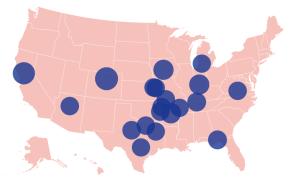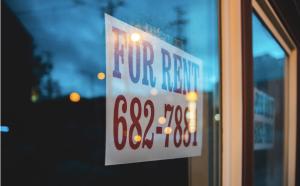Here's what you need to know about the new eviction moratorium
The Centers for Disease Control and Prevention has extended a broad moratorium on evictions until March 31.
“The certainty among renters that are out of work or have seen significant income declines that they will not be evicted in the coming months helps relieve a bit of stress amid a mountain of other stress,” said Greg McBride, chief financial analyst at Bankrate, a personal finance site. “This buys valuable time to hopefully get called back to work, find other employment, or see some rebound in household income, so they can resume meeting all their obligations as they had been pre-pandemic.”
But while the moratorium protects millions of renters, there are requirements one should review before the protection takes place. Here’s what you need to know.

How can I qualify for protection?
You must meet the following requirements to qualify for the rent deferral:
You must have used your “best efforts” to get any other rental assistance for your state or local government.
You can’t earn more than $99,000 this year, or $198,000 if you’re married and file a joint tax return. If you don’t meet those income thresholds, you can still qualify if you did not need to file federal tax return in 2019 or you got a stimulus payment this year.
You must be suffering a significant reduction in household income, a job loss, or major out-of-pocket medical expenses, defined as likely to exceed 7.5% of your adjusted gross income this year.
You must be doing your best make partial rent payments on time that are the most you can make given your circumstances.
You must demonstrate that you’re likely to become homeless if evicted.
If you fit these parameters you should then declare on a CDC form that you can’t pay rent due to a coronavirus-related hardship, and show your landlord.
Who isn’t qualified?
Personal leasing rooms in residential motels and other marginal housing situations may not be covered depending on state law, according to the National Housing Law Project, a housing and legal advocacy nonprofit organization.
Existing local or state moratoriums also supersede this order.
Do I have to pay in full this year?

A deferral in rents will lead to unresolved financial tensions for both landlords and tenants alike.
“This delays evictions, but does not prevent them – arrears for rent, utilities and fees will continue to accumulate and come due when the moratorium is over,” said Marybeth Shinn, Cornelius Vanderbilt Professor at Vanderbilt Peabody College of education and human development. “Reinstating the $600/week supplement to unemployment benefits is another way to help people who have lost their jobs stay current on rent.”
After March 31, renters will still have to pay their overdue payments, including any late fees, unless they work out a payment plan with their landlord ahead of time.
Is there any financial assistance included?
As of right now, there are no new financial assistance stipulations in the order.
Those in need of financial assistance should seek out state and local resources for relief aid.
President Biden recently included $30 billion in emergency rental, energy and water assistance assistance in his $1.9 trillion rescue proposal. A previous order noted that $7 billion in HUD funding was appointed to state and local governments, while another $142 billion in Coronavirus Relief Funds was also allocated to state and local municipalities.
“Many landlords are stuck holding the bag, especially retirees that rely on rental real estate for income,” McBride said. “A government program that instead made the rent payments would make everyone whole — the landlord, their mortgage lender, property insurer, and tax authority — and keeps the renter current rather than kicking the can of delinquency down the road to be dealt with later.”
In what circumstances can I still get evicted?
Your landlord may still have the option to evict you if you fall into any of these categories:
Commit criminal acts,
Threaten health or safety of other residents,
Damage property along with other offenses,
Violate any applicable building code, health ordinance, or similar regulation relating to health and safety,
Or violate any other contractual obligation.
Dhara is a reporter Yahoo Money and Cashay. Follow her on Twitter at @Dsinghx.
Read more information and tips in our Housing section




